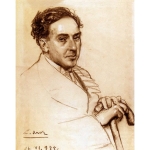What none knows is when, not if.
Now that your life nears its end
when you turn back what you see
is ruin. You think, It is a prison. No,
it is a vast resonating chamber in
which each thing you say or do is
new, but the same. What none knows is
how to change. Each plateau you reach, if
single, limited, only itself, in-
cludes traces of all the others, so that in the end
limitation frees you, there is no
end, if you once see what is there to see.
You cannot see what is there to see —
not when she whose love you failed is
standing next to you. Then, as if refusing the know-
ledge that life unseparated from her is death, as if
again scorning your refusals, she turns away. The end
achieved by the unappeased is burial within.
Familiar spirit, within whose care I grew, within
whose disappointment I twist, may we at last see
by what necessity the double-bind is in the end
the figure for human life, why what we love is
precluded always by something else we love, as if
each no we speak is yes, each yes no.
The prospect is mixed but elsewhere the forecast is no
better. The eyrie where you perch in
cold. You feel old, young, old, young: you scan the sea
for movement, though the promise of sex or food is
the prospect that bewildered you to this end.
Something in you believes that it is not the end.
When you wake, sixth grade will start. The finite you know
you fear is infinite: even at eleven, what you love is
what you should not love, which endless bullies in-
tuit unerringly. The future will be different: you cannot see
the end. What none knows is when, not if.



















Comment form: